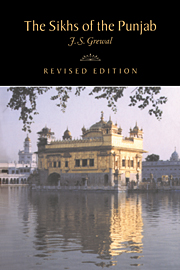Book contents
- Frontmatter
- Introduction
- 1 The Turko-Afghan Rule
- 2 Foundation of the Sikh Panth
- 3 Evolution of the Sikh Panth (1539–1606)
- 4 Transformation of the Sikh Panth (1606–1708)
- 5 Rise to political power (1708–1799)
- 6 The Sikh empire (1799–1849)
- 7 Recession and resurgence (1849–1919)
- 8 In the struggle for freedom (1920–1947)
- 9 Towards the ‘Punjabi Province’ (1947–1966)
- 10 In the new Punjab state (1966–1984)
- Epilogue
- Appendices
- Bibliographical essay
- Index
- THE NEW CAMBRIDGE HISTORY OF INDIA
- References
Epilogue
from 10 - In the new Punjab state (1966–1984)
Published online by Cambridge University Press: 28 March 2008
- Frontmatter
- Introduction
- 1 The Turko-Afghan Rule
- 2 Foundation of the Sikh Panth
- 3 Evolution of the Sikh Panth (1539–1606)
- 4 Transformation of the Sikh Panth (1606–1708)
- 5 Rise to political power (1708–1799)
- 6 The Sikh empire (1799–1849)
- 7 Recession and resurgence (1849–1919)
- 8 In the struggle for freedom (1920–1947)
- 9 Towards the ‘Punjabi Province’ (1947–1966)
- 10 In the new Punjab state (1966–1984)
- Epilogue
- Appendices
- Bibliographical essay
- Index
- THE NEW CAMBRIDGE HISTORY OF INDIA
- References
Summary
The Akali leaders present in the Golden Temple complex during Operation BlueStar were taken into custody along with some ‘extremists’ and ordinary visitors, including women and children. The countryside was combed in search of arms and ‘rebels’, and about 5, 000 young men were taken into custody. Quite a few innocent persons were killed in the process. Those who were supposed to have waged war against the state were to be tried by Special Courts. In reaction to the rumours of an attack on the Golden Temple, Sikh soldiers at several places in Bihar, Rajasthan, Assam and Jammu ‘mutinied’ to march towards Amritsar. Scores of them got killed in the attempt and a few thousand were marked for court martial. Some retired Sikh Generals who thought that these men had acted on the spur of the moment ‘under a great emotional stress’ wanted them not to be treated as ‘ordinary deserters’ but their appeal had no immediate effect on the trials.
Sikh reaction to BlueStar induced Prime Minister Indira Gandhi to rebuild the Akāl Takht. The octogenerian Baba Kharak Singh agreed to undertake this service (kār sewā) but only on the condition that the Golden Temple was cleared of troops. This was not acceptable to the Prime Minister. Her Minister Buta Singh persuaded Nihang Santa Singh to preside over the reconstruction undertaken essentially by the government. The speedily rebuilt Akāl Takht was handed back to the SGPC by October, 1984. This could hardly help; the building or rebuilding of the Akāl Takht had always been regarded as a prerogative of the Sikhs and their chosen representatives.
- Type
- Chapter
- Information
- The Sikhs of the Punjab , pp. 228 - 241Publisher: Cambridge University PressPrint publication year: 1991

